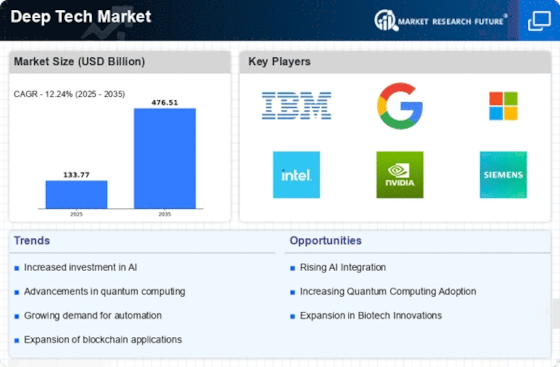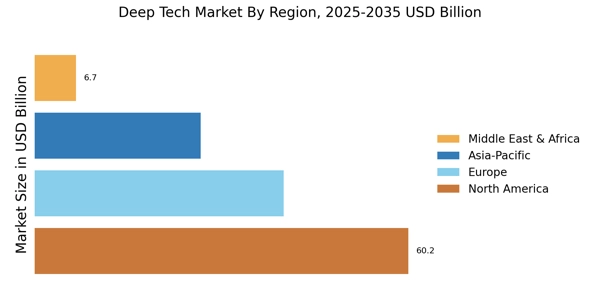Cybersecurity Imperatives
The rising importance of cybersecurity is a significant driver for the Deep Tech Market, as organizations increasingly recognize the need to protect sensitive data and infrastructure from cyber threats. With cybercrime projected to cost businesses over 10 trillion dollars annually by 2025, the demand for advanced cybersecurity solutions is escalating. This urgency is prompting investments in deep tech innovations that utilize artificial intelligence and machine learning to enhance threat detection and response capabilities. As regulatory frameworks evolve and organizations prioritize data protection, the Deep Tech Market is expected to experience substantial growth, with a focus on developing robust cybersecurity measures that safeguard digital assets.
Biotechnology Advancements
Advancements in biotechnology are significantly influencing the Deep Tech Market, particularly in areas such as genetic engineering, synthetic biology, and personalized medicine. The biotechnology sector is projected to reach a market size of approximately 727 billion dollars by 2025, reflecting a growing interest in biopharmaceuticals and agricultural innovations. These advancements are not only enhancing healthcare outcomes but also addressing global challenges such as food security and environmental sustainability. As biotechnological innovations continue to emerge, the Deep Tech Market is poised to benefit from increased collaboration between biotech firms and tech companies, fostering a multidisciplinary approach to solving complex problems.
Quantum Computing Potential
Quantum computing represents a transformative force within the Deep Tech Market, offering unprecedented computational power that could revolutionize problem-solving across various domains. The potential applications of quantum computing span from cryptography to drug discovery, with estimates suggesting that the quantum computing market could exceed 65 billion dollars by 2030. This anticipated growth is driven by the increasing need for advanced computational capabilities to tackle complex challenges that classical computers struggle with. As research institutions and tech companies invest heavily in quantum technologies, the Deep Tech Market is likely to experience a surge in innovation, attracting talent and resources dedicated to harnessing the power of quantum mechanics.
Internet of Things Expansion
The expansion of the Internet of Things (IoT) is a critical driver for the Deep Tech Market, as interconnected devices and systems become increasingly prevalent across various sectors. The IoT market is expected to surpass 1 trillion dollars by 2025, driven by the demand for smart cities, industrial automation, and enhanced consumer experiences. This proliferation of IoT devices generates vast amounts of data, necessitating advanced analytics and machine learning solutions that are characteristic of deep tech innovations. As organizations seek to optimize operations and improve efficiency through IoT technologies, the Deep Tech Market is likely to see a surge in investment and development of sophisticated solutions that leverage connectivity and data-driven insights.
Artificial Intelligence Integration
The integration of artificial intelligence into various sectors is a pivotal driver for the Deep Tech Market. AI technologies are being adopted across industries such as healthcare, finance, and manufacturing, enhancing operational efficiency and decision-making processes. According to recent data, the AI market is projected to reach a valuation of over 500 billion dollars by 2024, indicating a robust growth trajectory. This surge in AI adoption is likely to stimulate demand for deep tech solutions that leverage machine learning and data analytics. As organizations increasingly seek to harness AI capabilities, the Deep Tech Market is expected to witness significant investments and innovations, fostering a competitive landscape that prioritizes advanced technological solutions.

















